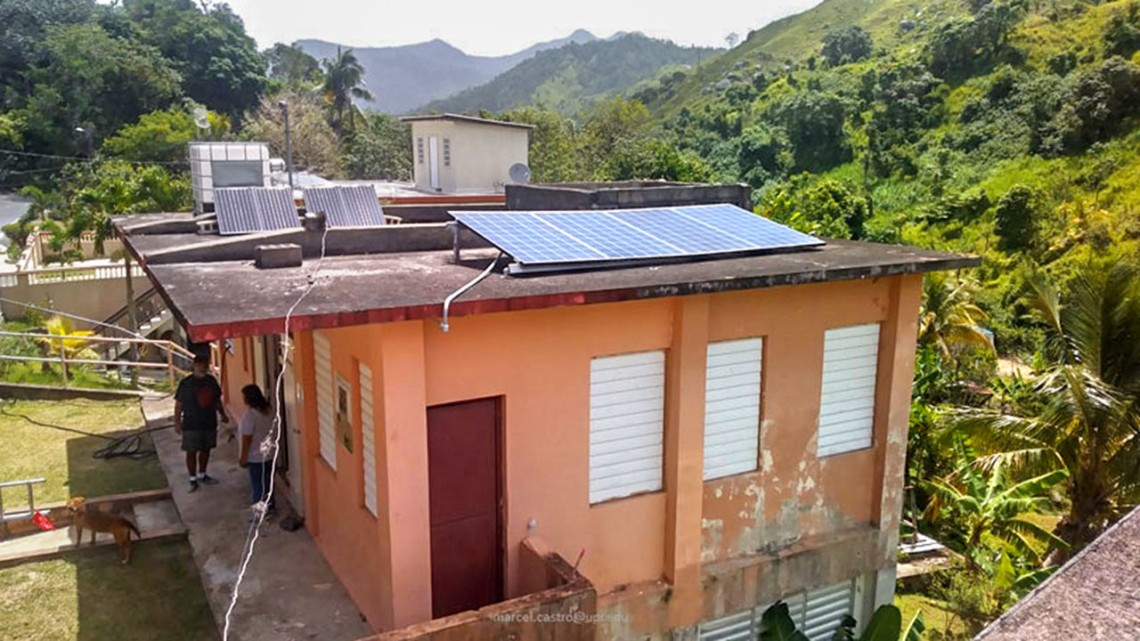
Rooftop solar photovoltaics power a home in Jayuya, Puerto Rico, located in the mountainous interior of the island.
Students propose solar solution to Puerto Rico’s electricity woes
By Jim Hanchett
Students in a hands-on infrastructure class in the Cornell Jeb E. Brooks School of Public Policy are urging government officials in Puerto Rico and Washington D.C. to promote rooftop solar power, and have developed a policy proposal that promotes the deployment of solar power in the most vulnerable communities.
Puerto Ricans have endured persistent and protracted power outages since Hurricane Maria devastated the Island in 2017. Hurricane Fiona last month was another reminder that the electricity problems continue. Students participating in the course concluded that rooftop solar must be a key part of the electricity infrastructure. The question is how.
“The proposal is the product of our annual graduate student infrastructure practicum where we present students with a real-world infrastructure challenge,” said John Foote, a lecturer in the MPA program. “Puerto Rico is an ideal location to study infrastructure because of the critical needs it has in energy, transportation, water and communications. Our students truly want to help. This is one way they can make a difference now and, as rooftop solar is adopted, for years to come.”
Rooftop solar power involves installing a photovoltaic system on the roof of a home as a primary or supplemental source of electricity. There may be financial, regulatory or information roadblocks to its installation and maintenance.
The project began in the spring when 11 students in the graduate student infrastructure practicum met weekly to learn about renewable energy. They then spent spring break in Puerto Rico, meeting with public officials, nonprofits and residents. A key ally in the effort was Ingrid Vila-Biaggi ’96, an environmental engineer, co-founder and president of CAMBIO, a nonprofit organization based in Puerto Rico that designs, promotes and implements sustainable policies and practices.
Over the summer, the students developed a final report they are now sharing with CAMBIO, government and utility leaders.
The report defines the goals of the project:
- Lower electricity costs and a reduction in the energy burden for low and moderate income (LMI) households.
- Provide reliable electricity to LMI households.
- Provide financial support for the Puerto Rico Electric Power Authority as it builds out its transmission and distribution infrastructure.
- Help Puerto Rico achieve its intermediate and long-term goal of a heavy reliance on renewable energy.
The students reviewed funding sources and determined that grants were available under a Federal Emergency Management Agency (FEMA) program that could help as many as 379,000 households acquire rooftop solar equipment and storage systems. An existing network of neighborhood-based community development financial institutions would promote the program house-to-house, administer the FEMA funds and provide low-interest loans to homeowners in case there’s a gap between the cost of a system and the amount of a FEMA award.
The next steps are up to an array of agencies and offices in Puerto Rico, but the Cornell students have given them a roadmap to a less vulnerable and more sustainable energy future. “Now with the current events surrounding Puerto Rico resulting from the most recent hurricane, I hope our collective work encourages and inspires both conversations and actions,” said master of regional planning student Sarah Carillo, one of participants in the project.
Jim Hanchett is assistant dean of communications for the Cornell Jeb E. Brooks School of Public Policy.
Media Contact
Get Cornell news delivered right to your inbox.
Subscribe
